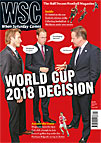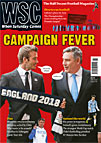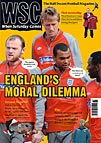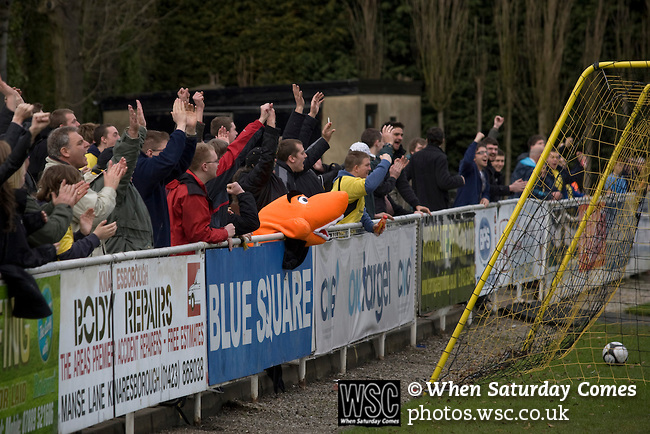Search: 'Harrogate '
Stories
 Dear WSC
Dear WSC
Although I thoroughly enjoyed the article on footballing statues (Striking a pose, WSC 294) it did miss out one rather infamous example – the Ted Bates horror show of a few years back. This short-lived “tribute” to the former Saints player, manager, director and president was astonishingly inept, with legs roughly half the length they should have been. To add to the indignity, more than once a resemblance to dignity-phobic Portsmouth owner/asset-stripper Milan Mandaric was pointed out. The overall effect was of a top-heavy, inebriated and besuited dwarf waving at passers-by. Not really the ideal summing up a lifetime’s service to a club.
Keith Wright, Cheltenham
 Dear WSC
Dear WSC
Howard Pattison (Sign of the times, WSC 286) wonders why there are so few official plaques to footballers in London, but goes on to answer his own question: most of the big names from the pre-war era were based in the north-west, and all the more recent players mentioned in the article died less than 20 years ago. The “20-year rule” – which applies to all suggestions made under the London-wide blue plaques scheme – is designed to ensure that the decision to commemorate an individual is a historical judgement, made with the benefit of hindsight. I could agree that Bobby Moore is as good a case as any for making an exception – but where, then, would you draw the line? The blue plaques scheme is run almost entirely on the basis of public suggestions. In recent years, considerable efforts have been made to increase the hitherto small number of nominations that have come in for sporting figures, including footballers. This has brought some success – Laurie Cunningham and Ebenezer Cobb Morley, the FA’s first secretary and author of the first football rulebook, are now on the shortlist for a blue plaque. As time goes on, more outstanding players and managers will become eligible for consideration, and surely join them. In view of this – and, among other projects, the involvement of English Heritage in the Played in Britain publications and website – the charge that “those who administer our heritage simply don’t see football as part of it” seems about as close to the target as a Geoff Thomas chip.
Howard Spencer, English Heritage
 Dear WSC
Dear WSC
In his article on football in film (WSC 278) Rob Hughes quite rightly says that the most convincing football scene ever takes place in Ken Loach’s classic 1969 film Kes. I attended the school that Barry Hines, author of a Kestrel For A Knave, worked in as a teacher. Mr Sugden, while probably never acknowledged by Hines, is clearly based on our old games teacher, Ron “Rocket Ronnie” Hallam. Ron was driven by a will to win at all costs and a classic Ronnie-ism was said to me when I tried out for the school team as an 11-year-old, “goalkeeping’s an art son”. I can still hear him say those words. In fairness to Ronnie he was right. I was never much of a footballer but was occasionally prone to bouts of brilliance. One such example came against Rocket Ron. He was playing a sweeper role when a ball was played forward for me to run on to. I pushed the ball past Ronnie and advanced on goal, easily rounded the full-back and slotted the ball under the advancing goalie. As I wheeled away, delighted with my goal, Ronnie was whistling furiously. He was yelling “offside, offside”. When I said that was rubbish he sent me off for arguing with the ref. Ronnie Hallam may well have been too keen to win at times but he was fantastically knowledgeable about football and cricket, and we didn’t waste much time on cross-country running. Some of Ronnie’s protégés went on to play professionally – the Shirtliff brothers turned out for Sheffield Wednesday among others and Steve Shutt played for Barnsley. Ian Swallow passed up football for a pretty successful cricketing career with Yorkshire. I guess one big disappointment was that Ronnie’s son, Matthew, never reached those heights. Rocket Ronnie though. A living legend.
John Hague, Leicester
 Dear WSC
Dear WSC
In response to my letter published in WSC 275, Mark Brennan Scott accepts that we send someone to each of the weekend’s Premier League games, to commentate live, but not unreasonably asks whether Match of the Day commentators ever “re-record bits they are unhappy with”. Not exactly, but the beauty of an edit rather than a live game is there is scope for tweaking both the sound and visuals by transmission time. Every now and then, a commentator will, for example, misidentify a goalscorer and then correct themselves, in which case we have been known to remove take one in the edit. I’ve found a copy of a letter I had published in WSC 240 in which I said: “If a commentator gets something wrong at the time we may even spare him his blushes at 10pm by removing the odd word.” That remains the case, but most of the time the commentator’s natural reaction works best. If it takes a couple of replays before they identify a deflection or suspicion of handball, that will nearly always feel more authentic than trying to look too clever after the event. In shortening a game for transmission, we may occasionally “pull up” a replay or remove a few words, but would almost never re-record any section of a commentary unless there’s been a technical problem. Furthermore, in all cases the commentators go home after the post-match interviews and a producer back at base edits the pictures and sound recorded at the time. In early days of the Premier League, only two or three games had multi-camera coverage and commentators present, so there were occasional attempts to add a commentary to single-camera round-up games, for example, for Goal of the Month. However, not every commentator was a convincing thespian and one or two “Le Tissier’s capable of beating three men from here and curling one into the top corner. Oh my word, he has…” moments did slip through. With multi-camera coverage and a commentator at every game, that no longer happens.
Incidentally, call us old-fashioned but there was a degree of pride in this office in MOTD’s recent use of “crashed against the timber” as cited in Steve Whitehead’s letter. Better that – or maybe “hapless custodian” – than some unpleasant modern notion like “bragging rights”.
Paul Armstrong, Programme Editor, BBC Match of the Day
